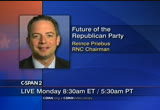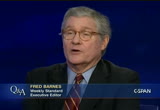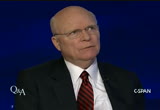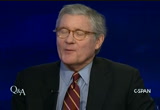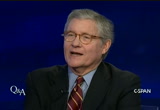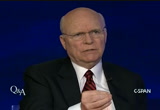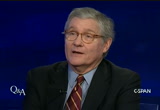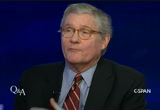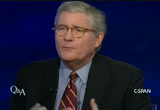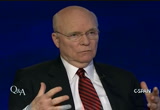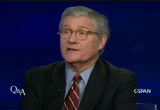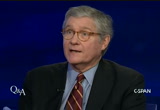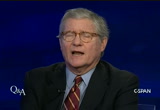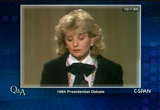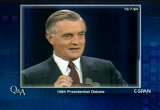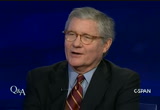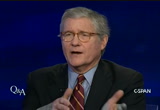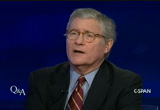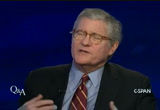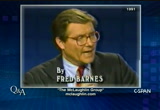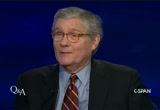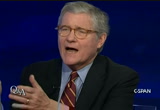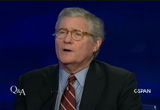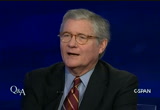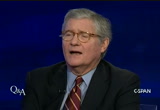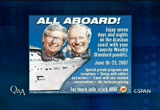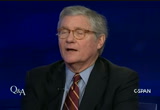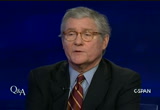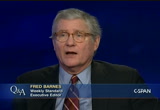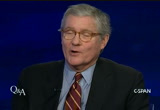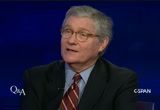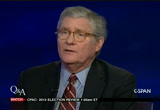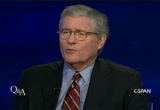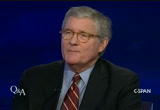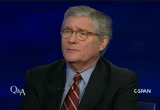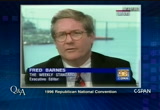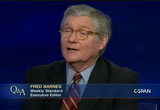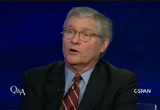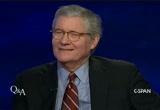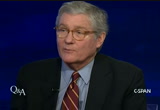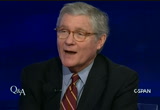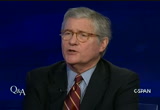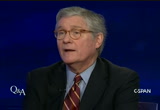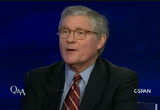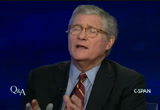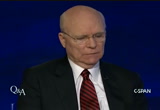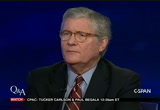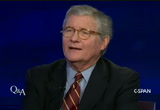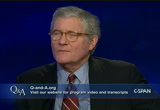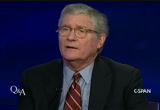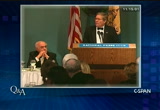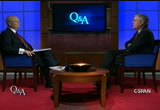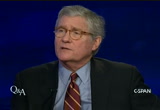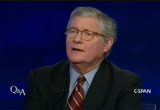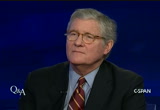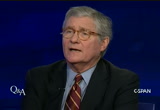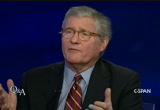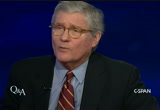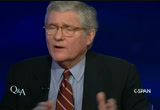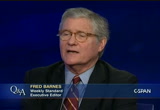tv Q A CSPAN March 17, 2013 11:00pm-12:00am EDT
11:00 pm
committee chairman talks about the future of the republican party. it is live beginning at 8:30 eastern on c-span2. , freds week on "q&a" barnes discusses his life in journalism. , can youarnes remember when you first got interested in being a writer? >> i was interested in being a reporter before a writer. my dad was a great consumer of newspapers and magazines among particularly conservative magazines. he would go home and bring, the "wall street journal" everyday.
11:01 pm
if you like politics and journalism, that is what you do when you get out of college. that is what i did. >> where did you grow up? >> i grew up in arlington, virginia. arlington is in those days is not what it is now. now it has a lot of young people in high-rises and so on. it was all single-family homes back in the day when i was growing up in the 1950's. my dad was in the military. >> what more than anything informed your views over the years? why did you begin to think the way you do? >> mainly through my parents,
11:02 pm
particularly my dad. he was very conservative. he was interested in politics. very interested in world affairs, particularly he was strong, a huge fan of the chambers for one. it really all came from him. this interesting politics and conservative politics in particular.it is amazing. i didn't realize it at the time when my dad changed what he was interested in, you know, a few months later, i would change. i was going to go to west point where my dad went. you know, i could not see you with a west point education, it has opened up a lot.it is much more of a liberal arts education
11:03 pm
now. then it was engineering and military tactics. i had no interest in that at all and i did not want a military career. >> when did you first read "witness"? >> so many years ago. i cannot remember when, probably when i was in college and after that cold friday, and i read "witness", i think three times now.my family has not to read it. with communism having waned, it will be harder for them to do it. >> so what is the big deal?
11:04 pm
>> he was a great writer, a beautiful writer, but he was a soviet spy, who ultimately rejected communism, embraced christianity, and felt the struggle in the world was not just between the soviet union and the united states, it was between communism and christianity. but of course he famously said he thought he was joining the losing side not the winning side, and then, of course, his famous clash with the state department official who he identified as the communist spy and all the liberal intelligence, and ultimately, now we know from evidence that it has come down in the last 30- 40 years. chambers was right. >> you talked about your christianity in your columns. why did you write about it? when did you become a christian?
11:05 pm
>> i became a christian, i grew up a christian. then when i went in the army when i got out of high school, i just forgot about it. i did not reject it. it had no meaning for me. i did not go to church. i did not think about it. well, then i got married and i had a couple of kids and my parents, again, my mother and father had a reawakening of their christian faith when they retired and moved to florida. it started when they moved to vero beach, florida, and they were different. i mean, i could see what happened in their lives and the
11:06 pm
lives of my sister and her husband and my kids and other people that i would meet, and it was really that it just was so appealing to me. christians i kept running into, probably not accidentally, but in any case, i can remember the exact day, it was right after thanksgiving in 1980 that i kneeled in my living room floor and my wife and i did and asked jesus into our lives. it has been very different since then. >> explain how it has been different. >> it has been different. i think about the world differently. i think about my job differently. you know, i used to be, i used
11:07 pm
to be kind of mean. i used to be -- i cared not at all what i wrote about people that it may hurt them. i try not to do that. you still have to be tough and honest, but it has particularly changed all my affairs in life. one of the great things about being in washington for me is having grown up here and being a part of a church, and you know so many people who could care less about politics. they are not involved in it. they don't read the magazine i write for "the weekly standard" >> you used to be mean? >> i was very mean. >> explain that.
11:08 pm
well, i drank a lot. i even smoked a little. i just had a very pessimistic view of the world, and pretty pessimistic view of other people. >> so what was the year that you became, i assumed you said, born again? what year was that? >> 1980. my wife and i both. you know, we decided. my parents prayed for us a lot and talked about their renewed faith, and people they met, they would introduce us to them. at first it had no impact at all. after awhile, it did. once my wife and i decided we would have two daughters. we have four children now. we had two little girls then.
11:09 pm
we would have them baptized in my parent's church in florida. we thought we were doing my parents a favor. we were doing this for them. my wife, who came from a completely unchurched background, we were on different phones. my mother asked my wife if she would like to be baptized. to my complete shock, she said yes. we went to their church, and my two daughters and my wife were all baptized. we got back to washington. we joined a church. >> back to your early career, as a writer, reporter, what was your first reporting job? how long did you just report not giving a penny? >> for a long time.
11:10 pm
i mean, i was a reporter for 20 years before "the new republic" magazine then starting "the weekly standard." my first job out of college, of course, i did not have a job. i wrote a bunch of newspapers in the south. i just, i did not want to go to the north. i kind of liked the south. anyway, i wrote a bunch of newspapers. one of them in charleston, south carolina, "news and courier" offered me train fare to come down and back and i leaped at it. they offered me a job at $80 a week. it was in 1965. i moved to charleston, south carolina. not a great news town as it turned out.
11:11 pm
anyway, charleston was not a big news town. it was not the state capitol for one thing. so after a year, i moved back to washington to go to graduate school at george washington university. i hated it. i am a grad school drop out. i dropped out pretty quickly. i got a job with "the evening star." the evening newspaper in washington was a very good newspaper that folded in 1981 you may recall. but i got, i started there as a dictationist. you know, people nowadays and journalists probably don't even know what a dictationist is. well when you work for an afternoon newspaper, reporters would be out.
11:12 pm
they would have to, you didn't have computers or laptops. you could type a story in and send it on. they call and would dictate off the top of their head their story and you would type it for them. then i became a local reporter and had a great time being a reporter. >> when did you start as a member of the john mclaughlin saturday group? >> well that started in 1984. i had been chosen as one of the
11:13 pm
three panelists in the first reagan debate. if you remember, back then, they had tried, debates were different then. >> hold on, before you tell us, we got some video of you at that '84 debate, the reagan and mondale debate. let's just watch that so you can tell the rest of us. the candidates were given a list of almost 100 qualified journalists from all the media. as moderator and on behalf of my fellow journalists, i very much regret, as does the league of women voters, that this situation has occurred. and now let us begin the debate. >> mr. mondale, you complained just now about jerry farwell and you complained about other fundamentalists in politics. correct me if i am wrong, i don't recall you ever complaining about ministers who were involved in the civil
11:14 pm
rights movement or the anti-vietnam war demonstrations or about black creators who have been so involved in american politics. is it all conservative that you object to? >> no, what i object to -- [applause] >> -- what i object to is someone seeking to use his faith to question the faith of another or to use that faith and seek the power of government to impose it on others. >> at that time, diane sawyer was there. you were there. it is interesting that those two men, especially mr. mondale, agreed that you and diane sawyer could be on the panel. >> yeah and jim was the other one from "the new york daily news." >> i was certainly surprised. >> i was a reporter for "the
11:15 pm
baltimore sun" and covered the national politics. i was also, by then, i had gotten more interested in politics, and i was writing a press column for "the american spectator" magazine. >> conservative? >> conservative. and i guess the mondale people didn't recognize that. i think my questions were very fair. i like mondale. mondale is a wonderful guy. >> you know, that whole atmosphere was different.
11:16 pm
there was the league of women voters. >> you have battled barbara walters. what role did she play? >> she was the moderator. they would answer a question and she would say, diane. she would move to the next one. >> what did it do for you? >> well, i got invited to be on "the mclaughlin group." that is how you originally asked about this. the next week, canon was on the way. i was on "the mclaughlin group." the truth is i knew contracting very well, bob novak is a good friend of mine. i never watched the show. in 1984 and after that, it led to, you know, being asked to be on television on other shows and ultimately becoming a regular in
11:17 pm
1988 on "the mclaughlin group." >> what impact did "the mclaughlin group" program have on this city? >> well, you know, mclaughlin was a genius for television. he could be a very difficult guy to get along with personally, although, i got along with him pretty well, but it was so much faster, and it was -- what it tried to get and succeeded a lot were the more candid outspoken views of people in journalism in washington and not just what they write. it was very fast moving, extremely opinionated, and you know, washington just had not seen anything quite like that. now we see a lot of that now particularly with cable news and so on, but mclaughlin group was a breakthrough and so many people, brian, over the years that have written or said or asked me about it, that somehow they believe, and i don't, but they believe that the whole dialogue in washington, politically, was changed by the
11:18 pm
mclaughlin group, that it became more polarized and more argumentive and so on. i don't really think so, but "the mclaughlin group" was a breakthrough. >> we have a clip again from mclaughlin. this is 1991. >> okay. all right. >> i think the united states' relationship with great britain, john major, because they have been associated with us in the battle is going to be very, very close between bush and major and there is going to be an exchange between the united states and germany which did little to nothing. >> what are you saying? >> i said major and george bush are going to be great friends. >> okay. >> you were right on all three accounts. what did you say? >> george bush by doing so well
11:19 pm
in the war, which he is going to win quickly will reelect himself. he will not have a republican challenger, pat is not going to run. >> jack? >> a year from now about the time of the first caucus of the primaries, the middle east and this war will be no more than a tenth on the list of issues or concerns to americans. >> so what do you think? >> i think i was wrong twice. when i said we would not run. i said bush would be reelected. pat ran. bush was not reelected. to this day, pat buchanan still sits in the chair. >> right. >> and as long as we are on that. zuckerman, you know, most people don't know, he is in real
11:20 pm
estate. >> well, yeah, he also owned "u.s. news" and "the new york daily news", so he is in journalism, too. >> so what do you think of? you work for "the weekly standard." you started "the weekly standard." tell us that story. >> well, i worked, i worked for "the new republic" magazine before that. i left "the baltimore sun" in 1985 then on that debate had something to do with it. and so i joined, i joined the new republic which had a famous white house column every week. it was written years ago by john osborne, a brilliant column, and when i came, i took it over who went to "newsweek" to be their bureau chief. that did not work out well. >> who owned that? >> marty paris who lived in cambridge, massachusetts, taught
11:21 pm
at harvard, and was one of these people who was moving jewish intellectuals who was becoming more conservative, particularly on the issue of israel and foreign affairs, but also on some, but not all domestic issues, so in any case, i went to the new republic in 1985, and one of the things i discovered there was how much the reagan white house relished seeing that magazine every week. the new republic would send 30 copies or something all bundled together immediately when the copies came to washington. struck me and some other people that, well, wait a minute. this is basically a liberal magazine. it wasn't liberal on everything. isn't there a time for a weekly magazine on politics and policy from washington? i mean all of us who got together to start the magazine were from washington. we didn't want to move to new york. you had a great magazine that comes out every other week.
11:22 pm
we wanted to start something different, and the first guy we talked to about it was a man named rupert murdoch who agreed with us. he funded the magazine for most of the existence of the standard until a man from colorado named philip anschutz who has made a lot of money in gas and other things and also owns the los angeles kings' hockey team, so anyway, that is how we started it. >> has it ever made money? >> not to my knowledge. magazines usually don't. that is why they tend to be owned by wealthy people or organizations that can somehow, you know, lose a little bit of money and still have the pleasure and putting out a magazine that reflects, in many ways, their views. >> what does the executive editor do?
11:23 pm
>> well, bill kristol was the editor. i write. i mainly write, as a matter of fact. i would not want some title of staff writer, of course. i want a big title, executive editor. there is a lot of title inflation in journalism like government and every place else. so we have a meeting. i commission stories. i have story ideas and most of the actual editing of articles i read them all, but i don't do much natural editing, you know, going on-line and rewriting a story or something. >> how many people? >> well, maybe 25 including the people on the business side. >> so when you sit down, and we see the republic is now owned by a young man named chris hughes and marty paris has written a and column in "the wall street
11:24 pm
journal" that blasted what chris is doing. he didn't like it. >> what did you think of that? >> i was not surprised. i kind of thought that. i mean, the new republic has moved away from the old new republic. it is a magazine that has white space in it. >> i want to show you an ad that was in the publication in 2007. well let's see if you remember this ad. on the screen, "all aboard, enjoy seven days and nights on the alaskan coast with your favorite weekly standard pundits, june 16-23, 2007 special private programs and receptions." on and on. like-minded conservatives. what was the impact of that
11:25 pm
cruise on american politics? >> sure. well i think the discovery of sarah palin was one thing. on the cruise, we went up there in southern -- we were not up around anchorage in that part of alaska, but we were there. in juno, we were invited by the governor to have lunch at her house in the governor's mansion. i found out later, this came about because the woman who was the head of the alaska federation of republican women or whatever the title is and had told the governor's space that we were coming and, at first, she was ignored. she told them again. and then we found out we round up getting this invitation. i am not sure sarah palin was a weekly standard reader. at any case, we were invited.
11:26 pm
we went to her house. we all had lunch. i sat right next to her. i will have to say she was impressive. particularly on the issues that she knew a lot about, which in alaska, are energy and the environment. and so when i got back, after that, i decided i would write a story about her. i mean, i heard a little bit about her. you don't hear much about alaska politics down here, for heaven's sake. she had run against the incumbent governor, republican, had defeated in the primarily then won the election in 2006 which was not a good republican year, but alaska is a pretty republican state and she won. so there she was in 2007. so i came back.
11:27 pm
i interviewed a bunch of people by phone and talked to her twice. i interviewed her twice on the phone and wrote a piece for "the weekly standard" about sarah palin. it was the first piece written about her in the national magazine in the united states. i don't go around bragging that i discovered her. >> the reason i ask you about this is here's "the weekly standard" magazine. this is a recent issue. most weeks, how many pages? 36 or so. >> 36 or 40. >> when did you know that column might have had an impact, led eventually to john mccain choosing her as vice president?
11:28 pm
>> when i knew when her name had started popping up. >> did you find out directly? what person saw that and reacted that strongly to it? >> well, it was one person who saw it and reacted strongly was bill kristol. he started talking her up. this was back in the summer of 2008 when john mccain obviously had to pick a running mate. and bill talked about her a lot on television. >> but is it somebody like philip anschutz, he did not own it at the time. it was owned by rupert murdoch. >> did they feel the power of that thing? did you get feedback from him saying that is why i spend this money every year on that magazine?
11:29 pm
>> occasionally, but not on that article. sarah palin. >> well, why do people, you know, philip anschutz is the 33rd most wealthy person in the united states. why did they spend this money on these kinds of things? >> i think for different reasons. murdoch is a guy who has been in journalism his entire life. he is a content guy. who cares about content? one of the interesting things i can do with rupert murdoch. he will go through magazine and critique it.
11:30 pm
who reads it? you know, you find that particularly in washington, republicans read it, some democrats, but particularly at the clinton white house they were interested in getting copies of "the weekly standard." not just elected officials but consultants, strategists, people in government and so on read it. and then we have, we make sure that we have a great readership in the journalistic community in washington. i mean, about 400 copies on the weekend on sunday. they get one at home. so you have the political community, the journalistic community and the academic community. being at the new republic, i remember how, how widely read the new republic was in the academic community. of course, they did not like my stuff. i get letters saying why are you
11:31 pm
there? at the conservative academic community is a lot smaller, but we circulate among them, too. when you have that great readership, it helps. >> in the wikipedia site-- it talks that he possibly bought this for $1 million from rupert why did he not want to sale? i never have known why he wanted to sell. >> is that scary when he said he wants to get rid of this? was it all arranged in advance? >> we heard about it when it was announced. >> philip anschutz was about to buy it.
11:32 pm
>> we heard about it then. i am not sure why he sold it. i don't know the reason why he got rid of it. we heard stories about members of his family, didn't like the magazine and so on, but i have no idea whether those were true or not. >> has philip anschutz had any involvement since he bought might sure. he comes to washington. he critiques the magazine differently from the way rupert murdoch did. he is interested in the business side.
11:33 pm
anschutz, he is not in it to be a big figure in washington. he is here three or four times a year, and even in the los angeles kings, is a private figure. the los angeles kings won the stanley cup last year in the national hockey league, my question was: will he actually appear with the team holding the stanley cup? because you never saw him at games or anything. he did for one picture. >> here is something called the washington examiner which is a small, i don't know how many pages every day. it is a free. >> it is pretty good.
11:34 pm
>> 48 pages. >> it is conservative. all conservative columnist. this showed up this town a couple of years ago. >> right. >> why would he do this? can he make money here? >> let's go to more video from 1996. you are appearing on this network asking a question of somebody you ended up writing about. >> governor bush, this is fred
11:35 pm
barnes. >> yes, frederick. >> colin powell served your father when was president, of course, during dessert storm and so on. he will speak tomorrow at the convention. what role do you see him flaying in the campaign? might he possibly be designated as dole's secretary of state if he wins? >> would that be helpful? >> i think so. i am not so sure you would want to designate any cabinet officers prior to the election, see nothing wrong with saying that in that foreign policy matters, colin powell will be my chief adviser. i would think that would be a smart move. this is a decent fella who served this country well, and i think that would be, i mean if you are asking do i think he
11:36 pm
would be a great secretary of state? you bet. >> mr. barnes? >> that was good question. that was one of the better once i asked. >> what would you say today about colin powell? >> oh, well, who? george bush. >> yeah. >> he would probably say the same thing. certainly there is a rift between them over foreign policy and it opened up while powell was still his secretary of state. >> twitter. fred barnes is on twitter. why? >> my son has convinced me that i have to be on twitter. don't tweet much. but i tweet occasionally.
11:37 pm
11:38 pm
i will read some of the twitter messages that you sent out. you a you a you november the 5th, 2012.and >> okay. >> "why romney will win." >> you can say i have been wrong in a a few times. you know, there were a lot of polls. i have always placed great stock in gallop. and the gallop got this election wrong as did some other pollsters.a >> why in this business, sticka their neck out on predictions? i mean so many are wrong.and is >> i don't know. why did i do that?
11:39 pm
i didn't have to do that. in other words, i was, i was wrong, i was proven wrong the next day, i think. >> october 8th, you said this in your twitter message. "the media pull out all the stops to reelect the president." did you really believe that? >> let me -- maybe they did not pull al the stops but certainly pulled out some of them. i like the way they covered the campaign. normally would you take a presidential campaign within the president is running for re-election, his word would be a big issue. they completely ignored it. the record. it was all about what he was doing in the campaign.
11:40 pm
romney, of course, wanted to make obama's record a part of the campaign and he was highly critical of it. the press didn't pay any attention to that. romney's record, they paid a lot of attention to, going back to his time at bain capital in particular which is why the obama campaign was trying to make the issue. they succeeded. the obama campaign did, i mean, this was, this was not a normal election. a normal re-election of a president election in 2012. because with the complicity of the press, the issue of romney and being a corporate predator and all of that had become as big or bigger an issue than obama's actual record in the first four years. >> so in reading, you get the impression you feel like you are surrounded by journalists that are all liberal? >> yeah. >> do they tell you what they
11:41 pm
think?. >> no, they used to when i was younger and was out covering campaigns al the time, but i certainly read them, and it has not changed. >> you know what the liberals would say when they are sitting here talking to you. >> yeah. >> the conservatives whining when they have rush limbaugh and sean hannity and a lot of other talk show hosts. they have weekly standard and the washington examiner and fox news. >> yeah. well, there is an alternative conservative media that did not used to exist. >> how has that changed this world? how has that changed this town? >> washington is a liberal town. it really has not changed washington much. more jobs for conservatives in journalism than there were.
11:42 pm
it has not changed that much. it these mainstream media i which is liberal. they decide what the story is. republicans controlled the senate, not the house, but rage gain has been successful in getting things through the house. immersed a whole bunch evidence to say that there had been, i called it media realignment. that the media was getting more conservative or at least less liberal and i wrote a whole piece on the cover of the new republic. >> does it matter though? >> of course it matter? >> why?
11:43 pm
>> look at the 2012 bam campaign. >> you never changed your views and you lived around the liberal media? what does it matter? are they all sheep following the media says? >> oh, who? >> others. >> the reporters. well, there have been some who have come out. i remember charles when he was liberal. i remember mike when he was a pollster for a liberal democratic polling firm. so some people have changed. >> i am talking about the public? >> sure. >> the public, does the public see only liberal coverage and say, yeah, that is the way i think?
11:44 pm
>> you don't? >> no. >> look, the public is not paying as much attention as i am and you are and those of us who are part of the political community. you know, there is what i call the political community is about probably about 10 million people. it's the people that watch c-span, they watch meet the press, they watch fox new, they want, they watch cn but they care about politics a lot. most people just get sort of what guess on in politics and washington and in journalism. >> i am looking at column you wrote in 2004. i am going to read the first couple of lines to see if you
11:45 pm
can tell the rest of the story. >> a few years ago michael moore who is now promoting a anti-president bush movie entitled fahrenheit 9/1, announced he had gotten the goods on me. indeed hung me out to dry on my own words. it was in his first best selling book, stupid white men. moore wrote he had once been forced to listen to my comments on a tv chat group. moore said and round up by bell lowing: these kids don't even know what the iliad and the odd i have. what did the rest of the column say? do you remember? >> i don't. >> you are accused him of lying? >> yeah. >> he said he called you. >> yeah. >> did he call you?
11:46 pm
but he know, i thought about it later after he said he called me and i was wrong in what i had written in there. >> he said you read it. >> that is ridiculous. >> well, the third paragraph, the only problem is none of this is true. it never happened. moore is a liar. >> well, certainly not what he said i said or so on. it was not true. you know, i thought about it later. he actually may have called me. >> you don't think you said that? >> of course not, that is ridiculous. >> how often in your opinion do people lie in politics?
11:47 pm
>> sure. yeah. there all kinds of different words. they don't flatly lie that much. they exaggerate. >> you wrote a book about george bush. you got kicked around by some of the media. did you read any of that? >> as little as possible. but i know it got kicked around. you know, i said when i wrote the book that i was not going to read the reviews. well i read a couple. >> did you read the washington monthly? >> i did. i ran into him after this on the train and -- he says, let me just read a little bit of it? i had not read the review. >> "bill kristol may show more
11:48 pm
to conservative and to the president" you can always find barnes calmly towing the administration's line. then later on he said hes the perfect bush hack. >> i guess he didn't like the book. >> but you know that you have got criticized for that. >> sure, of course. i was generally in agreement with the bush administration particularly on foreign policy, way was the most critical area. >> why? why were you? can you remember what it was? because you on the fox news when were you on there at night on the 6:00 show, were you almost always on the administration's side. >> i was. >> people sit out and say oh my goodness, the guess again? they say that about other
11:49 pm
people, too. >> why did you like the bush administration? >> well, because i thought the policies were right on domestic policy not so much the spending, but on domestic policy, the tax cuts and so on. here is a clip and a little bit 8:48:58:09pm of a roast one night at the press club. well, i am flattered to be here following jack and talking about bob novak and the two people in journalism who i learned the most from and admired the most over the years. >> i spent the last few days doing the exhausting job of reading bob novak columns, going back many, many years, it was time-consuming, not very exhilarating and i discovered that bob after reading your
11:50 pm
columns, so many of them, i have dom the conclusion that your words will be remembered long after shakespeares are forgotten. but not until then. >> what did you the 506-page plus book was ever written in washington? it may be the best book. i can think of one better. i will get to that in a moment. because, and when we get young people, interns, and young reporters at "the weekly standard", i tell them. read bob novak's book because it will tell you are more about american politics and washington over the last 50 years than >> one of the things that he did that i had never seen before was he told you how much money. >> yeah. >> what did you think of that? i know you speak far living and
11:51 pm
that. and it is all based on being on television. i have never had anybody call me and say, boy, that was a great article you wrote in the standard and we want you to speak to our group in and we'll pay you such and such. it has never happened. >> is "the weekly standard" more popular during obama administration or the bush administration? >> you know, it is about the same. i think. >> you didn't get a rash of news? >> a little bit. but not really that much. >> and what about your experience now with fox news? are you still doing the commentary? >> i do some but a lot less. >> why?
11:52 pm
>> well, that is partly the decision of fox news, but you know, going with other people. i did special report, the show that is 6:00 to 7:00 eastern time. brit hume was the host. i was there almost every night. brett comes in. he wants to have his own people. >> how far do you go back? >> high school. >> what was he like in high school? >> he, i guess, he has changed a lot. >> in what way? >> he was, he was always pretty self-confident, spoke very well. he was not particularly a great student, nor was i when we were together at the university of virginia. we both went in the same line of work.
11:53 pm
>> when he was here right after he retired. he talked about his relationship with jesus christ, the same thing. >> right. >> that is new that people talk about this in public? journalist talk about it? >> you must have asked. >> i did. i say, there was time when people would say i am not talking about my religious beliefs. >> well, that is not true, i think, these days among born again christians. you know? they are willing to talk about it. i have. >> i have a column from 2012 where you talk about chuck who died in 2012 back in probably
11:54 pm
april or something like that. you say that he wanted me to give a talk somewhere about my life as a christian while working in the secular national media. i said yes. not i had a great story to tell. you say that you believe chuck's prison ministry? there are people that looked out and said he is just the same guy he was in the administration. >> i know. >> why? >> because it went on for so long. that is why. of course, he had this reputation of being the ultimate hatchet man. but, look, one of the things, i try not to judge anybody's state of faith, but i mean, his just
11:55 pm
struck me over talking to him many times and what he did over many, nanny years, you know, decades, has been entirely sincere, honest, legitimate, and this was the real chuck colson. >> when people come to this town now, they always ask, what is the difference today than it was 40 years ago. you have been here forever. >> yeah. >> what is your overall analysis of the country of the town even of the religious beliefs to the country? >> well washington was a town in the '50's when you lived in arlington across the river, that is how far it went. it was quite different. what you didn't have in washington and that you do have now is this great permanent community that produces buzz all the time in town. but the lobbyist and the elected officials and the consultants and all the people that are involved in politics within way or another and the press is a big part of this, i mean, for one thing there is a lot more of
11:56 pm
the media here than there was 50 years ago. and so it just sort of changed the way washington operates. you have this political hum and buzz that is going on all the time and you did not used to have that. and the other thing is, brian, nobody leaves washington. you know? 40-50 years ago, a congressman would retire or move back wherever he came were. people would go back, too. you were warped in an executive administration, you would leave. nobody leaves anymore. >> more honest, less honest? >> gee, i don't know whether you could, there is more reporting about what guess on. it is more, it is more, it is certainly more transparent not all that transparent but a lot more.
11:57 pm
the house ways and means community used to have no public meetings back in the old days. that is where reporters like bob novak really developed their skills and source development and so on. but the washington and why is that nobody leaves? there is only one reason. money. they stay here. if you are somebody who works on capitol hill for a few years and works in the house ways and means committee and you a lawyer and you worked there five years. you can get a job making hundreds of thousands right away as a lobbyist, and not necessarily as a lobbyist, just as a reporter. >> better reporting back when we started or now? >> certainly different. but there is more of it, it is much more opinionated than it used to be, so i would say, probably not better, but you can, look, when you have internet, you have so much on television and there is just
11:58 pm
more information that you can get and you don't have to try that hard but if you try hard you can get an lot. >> is fred barnes going to write a memoir? >> no. >> are you going to where it anymore books at all? >> yes. >> on what? >> subjects that i am interested in that i would like to write about. you know, there is some people who have been important in 39 america over the last 400 years that have not been written about enough. i mean certainly it is not lincoln. lincoln has been written about more than anyone else or thomas jefferson. people like alexander hamilton and henry clay. >> there is one person i have not asked you about. your wife. where did you meet her? >> i met my wife in washing we were set up on blind date by
11:59 pm
her roommate in college, who knew friends of mine, and this might have been 1966, and we dated every night for a year and then got married in 1967. >> what did she do? >> well, she went to gw. teacher in the washington, d.c. she taught the sixth grid at school in southwest washington and she got pregnant. >> her name? >> her name is barbara. >> for a dvd copy of this program call 1-877-662-7726. for free transcripts or to give us your comments about this program, visit us at q&a. org.
158 Views
IN COLLECTIONS
CSPAN Television Archive
Television Archive  Television Archive News Search Service
Television Archive News Search Service 
Uploaded by TV Archive on

 Live Music Archive
Live Music Archive Librivox Free Audio
Librivox Free Audio Metropolitan Museum
Metropolitan Museum Cleveland Museum of Art
Cleveland Museum of Art Internet Arcade
Internet Arcade Console Living Room
Console Living Room Open Library
Open Library American Libraries
American Libraries TV News
TV News Understanding 9/11
Understanding 9/11